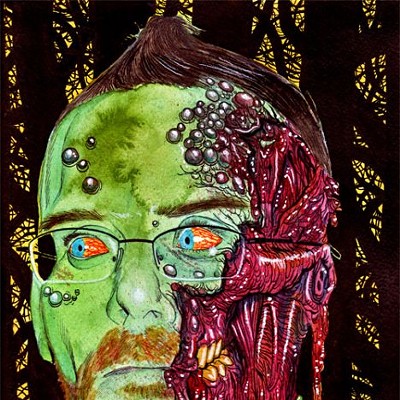Broadly speaking, there are two types of science fiction: You have your book-based science fiction and your film-based science fiction. Though exceptions are legion, the best book-based science fiction tends to be based on ideas — thoughtful, nuanced explorations of “What if?” that riff on as-yet-unrealized scientific discoveries or technologies. Meanwhile, the best film-based science fiction, while it has some ideas, is more tilted toward spectacle, substituting brilliant set design and gorgeous fictional realities for the dense, idea-driven narratives of book sci-fi. This makes the occasional sci-fi film “thinker” all the more precious, and in Moon, director Duncan Jones gave us one hell of a great thinker of a sci-fi film.
In the film, we meet Sam Bell (played by Sam Rockwell), a contract worker on an isolated moon base. For three years, he’s the sole occupant of the base, apart from a robot companion named Gerty (voiced by Kevin Spacey) that tends to his needs. His communication with Earth is limited to recorded messages sent back and forth, thanks to a damaged satellite that his company considers a low priority to fix. While working outside the base, he suffers an accident and awakens inside, with no memory of what happened and under orders — enforced by Gerty — to stay inside. That, and a few other odd occurrences, arouse his suspicion, and he manufactures a reason to go outside. Once out there, he finds a crashed rover — and someone who appears to be himself inside.
What follows is a master class in using ideas to make a film work. The two main characters are played by a single actor. The only other actor with a significant role appears as a disembodied voice, a robotic arm and a series of smiley-face emoticons. The action is minimal (there's a fistfight, but it’s played mostly for emotional impact, not to resolve a plot point or liven things up), and there’s not a single explosion to be found anywhere. During entire stretches of the film, the most “exciting” thing to happen is a man working on a model and playing ping-pong with a copy of himself. For all that, the movie never gets dull and, in many ways, is only improved by multiple viewings. And that’s all due to the ideas the film deals in.
Many of those ideas are big, the kinds of ideas that philosophers have spent entire lifetimes trying to answer, like what is the nature of identity and self? Of course, they're all filtered through the lens of science fiction, posed into forms such as this: When you wake up to a copy of yourself, how does that impact your view of who you are and what your life has meant? Some of the ideas are smaller, like how being alone for years, except for a friendly robot, affects you. Also, how much does a person change in the course of three years, and how much would that vary given only minimal differences in experience and circumstance? Some of the ideas are current, or near-future, like what are the ethics of human cloning, and what are the acceptable uses for such a technology? And despite those ethically acceptable uses, what kind of uses might corporations find for such a technology, especially if they could hide it where no one could find it, like on the moon?
The film doesn’t offer a lot of answers, just questions and thoughts. That’s what makes it such a moving and effective piece of art. It doesn’t preach at you that this is bad thing, but it does paint a convincing portrait of the anguish a man might go through when he discovers he might not be a real, live boy after all, but some weird piece of technology who will live and die his entire, brief life doing the equivalent of light janitorial work and laboring under the delusion that someday he gets to return home to his family. It depicts the cold, empty loneliness of that life, and the havoc it wreaks once the illusion of hope is destroyed. If nothing else, it offers a hell of a sympathetic portrait of the replicants from another classic sci-fi thinkpiece, Blade Runner: You’ll understand why Roy Batty was so homicidally pissed once you spend ninety minutes with Sam Bell(s).
It’s not a perfect film. It’s slow, and the science and technology are both kind of eh, but they work well enough in support of the story and the ideas. The ending is maybe a tiny bit trite. Those are minor issues in the face of such a thoughtful, well-composed film with so many ideas to offer. It’s the kind of film that sticks with you long after it’s over, and the kind of film that pushes science fiction into the rarefied air of Great Art. There are no lightsaber battles to be found, and no ten-year-old will have his life changed by seeing it, but it might change a thirty-year-old’s life — or at least make them think.
And that’s no small thing at all.
See Moon at 7:30 p.m. Wednesday, July 20, at the Alamo Drafthouse. For tickets, $7, and more info, visit the Alamo Drafthouse website.
[
{
"name": "Air - MediumRectangle - Inline Content - Mobile Display Size",
"component": "12017618",
"insertPoint": "2",
"requiredCountToDisplay": "2"
},{
"name": "Editor Picks",
"component": "17242653",
"insertPoint": "4",
"requiredCountToDisplay": "1"
},{
"name": "Inline Links",
"component": "18838239",
"insertPoint": "8th",
"startingPoint": 8,
"requiredCountToDisplay": "7",
"maxInsertions": 25
},{
"name": "Air - MediumRectangle - Combo - Inline Content",
"component": "17261320",
"insertPoint": "8th",
"startingPoint": 8,
"requiredCountToDisplay": "7",
"maxInsertions": 25
},{
"name": "Inline Links",
"component": "18838239",
"insertPoint": "8th",
"startingPoint": 12,
"requiredCountToDisplay": "11",
"maxInsertions": 25
},{
"name": "Air - Leaderboard Tower - Combo - Inline Content",
"component": "17261321",
"insertPoint": "8th",
"startingPoint": 12,
"requiredCountToDisplay": "11",
"maxInsertions": 25
}
]











